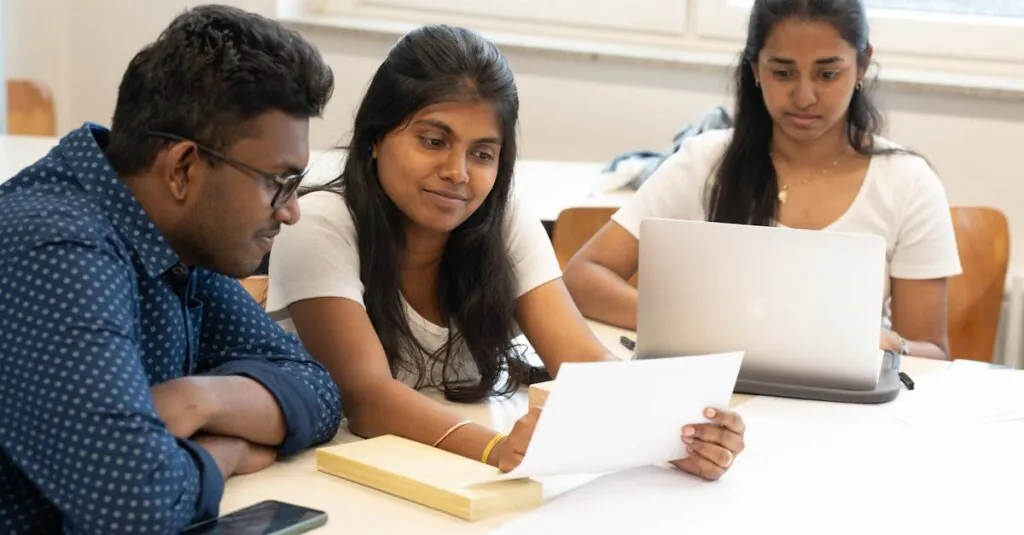Table of Contents
ToggleIn a world where smartphones are practically an extension of our arms and TikTok dances can go viral overnight, 21st century education is evolving faster than a cat video can rack up views. Gone are the days of rote memorization and dusty textbooks. Today’s learners crave dynamic experiences that spark curiosity and ignite creativity.
Understanding 21st Century Education
21st-century education prioritizes critical thinking, creativity, and collaboration. It fosters an environment where students engage actively in their learning processes. Learners now emphasize real-world problem-solving over rote memorization. Technology integration plays a significant role in this evolution, allowing access to diverse resources.
Curriculum redesign focuses on interdisciplinary learning. Subjects often blend together, helping students see the connections between different fields. Assessments reflect this shift, favoring project-based evaluations. Students demonstrate understanding through practical applications, not just standardized tests.
Teachers adapt their roles as facilitators rather than mere sources of knowledge. They guide students in exploring topics deeply and encourage exploration. Professional development for educators emphasizes the latest teaching strategies and tools, ensuring they remain effective in the classroom.
Digital literacy becomes essential in 21st-century education. Students navigate online content, discerning credible information from unreliable sources. This skill set equips learners for a world densely populated with information.
Collaboration extends beyond the classroom walls, engaging community partners and organizations. Students often work together on projects, instilling a sense of teamwork and social responsibility. In this interconnected landscape, fostering inclusivity and diversity enhances learning experiences.
Emphasis on social-emotional development nurtures well-rounded individuals. Schools incorporate mindfulness and well-being practices to support mental health. Such approaches create a supportive learning atmosphere, promoting resilience and adaptability.
Overall, 21st-century education redefines traditional educational paradigms, equipping students with necessary skills for future success. The transformation champions a holistic approach to learning, inspiring curiosity and lifelong learning.
Key Components of 21st Century Education
21st-century education comprises several key components that shape modern learning experiences. These components emphasize critical skills necessary for student success in a rapidly changing world.
Critical Thinking and Problem Solving
Critical thinking and problem solving serve as foundational elements in 21st-century education. Students engage in real-world issues, analyzing information and developing solutions. Through inquiry-based learning, they learn to question assumptions and evaluate evidence effectively. Encouraging diverse perspectives promotes deeper understanding. Class discussions and projects help refine analytical skills, preparing students to tackle complex challenges beyond the classroom.
Collaboration and Communication
Collaboration and communication gain prominence in contemporary education. Group projects foster teamwork, allowing students to exchange ideas and develop social skills. Learning to work with peers enhances their ability to articulate thoughts clearly and listen actively. Teachers facilitate environments that promote open dialogue and constructive feedback. Utilizing technology tools supports these skills, enabling virtual teamwork and broadening communication avenues with global partners.
Creativity and Innovation
Creativity and innovation play vital roles in inspiring students. Encouraging original thinking allows learners to explore ideas beyond conventional boundaries. Projects that require creative approaches stimulate imagination and foster entrepreneurial skills. Integrating technology provides platforms for creative expression, from coding to digital art. Schools prioritize environments that nurture innovation, equipping students to adapt and respond to future challenges effectively.
The Role of Technology in Education
Technology serves as a cornerstone of 21st-century education, enhancing learning experiences and engagement. It transforms how students acquire knowledge, encouraging interaction and collaboration.
Digital Literacy
Digital literacy represents a critical skill for modern learners. Students must navigate the vast information available online. They engage with various tools and resources, discerning credible sources from unreliable ones. Proficiency in digital communication fosters effective collaboration and encourages innovation. Moreover, educators integrate digital literacy into curricula, ensuring students feel confident in using technology for research and project development.
Online Learning Platforms
Online learning platforms revolutionize traditional education methods. These resources offer flexible, accessible learning options for students. They provide diverse courses catering to different interests, allowing for personalized learning experiences. Students engage in interactive modules and activities, reinforcing concepts through practical application. Additionally, these platforms connect learners worldwide, promoting cross-cultural collaboration and understanding. Integrating online learning fosters self-paced growth and equips students with skills for tomorrow’s challenges.
Challenges in Implementing 21st Century Education
Implementing 21st-century education comes with significant challenges that require careful consideration.
Access and Equity
Access and equity pose major hurdles in modern education. Diverse socioeconomic backgrounds affect students’ ability to benefit from technology. Many students face inadequate internet access and lack of devices, further widening the achievement gap. Schools in low-income areas often struggle to provide resources like updated materials and technology. Effective strategies must address these disparities to ensure all students can engage with 21st-century learning practices. Collaborative efforts between schools, communities, and policymakers play a crucial role in promoting equal access for every learner.
Teacher Training and Development
Teacher training and development present another challenge in this educational evolution. Educators often require ongoing professional development to adapt to new teaching methods. Many existing training programs may not cover the latest technologies or pedagogical strategies effectively. Bridging this gap is essential for teachers to foster creative, collaborative classroom environments. Support systems that offer mentorship and hands-on experiences in modern teaching strategies encourage continuous growth. Ensuring teachers feel confident using technology enhances their ability to facilitate student engagement and learning.
Future Trends in 21st Century Education
Emerging technologies shape the future of 21st-century education. Artificial intelligence tools enhance personalized learning experiences, catering to individual student needs and learning paces. Virtual reality enables immersive experiences, allowing learners to explore complex concepts in impactful ways.
Adaptive learning platforms gain popularity, leveraging data to adjust content and pace based on student performance. Gamification strategies engage students, motivating them through interactive and fun learning experiences. Online assessment tools offer real-time feedback, helping educators track progress and tailor instruction effectively.
Project-based learning continues to thrive, encouraging students to tackle real-world issues and collaborate with peers. Schools are redesigning curricula to integrate interdisciplinary approaches, reflecting the interconnected nature of knowledge.
Social-emotional learning remains a priority, nurturing resilience and empathy within student populations. Mindfulness programs incorporate practices that support mental health and well-being, fostering a supportive school culture. Collaboration with community organizations enhances educational experiences and exposes students to diverse perspectives.
Developments in digital citizenship education become vital as students navigate online spaces. Schools emphasize the importance of understanding digital footprints and responsible technology use. Lifelong learning skills cultivate a mindset that encourages continuous growth, preparing learners for dynamic futures.
High-quality professional development for educators is crucial. Teachers require support as they adopt new tools and methods that engage today’s learners. Innovative teaching strategies are essential to keep pace with advances in technology and student expectations.
Finally, equity in education remains a pressing issue. Ensuring equal access to technology and resources is necessary for all learners. Schools are increasingly involved in closing the gap, promoting collaborative efforts that support every student’s success.
The landscape of education is undergoing a profound transformation in the 21st century. Emphasizing critical thinking creativity and collaboration prepares students for a rapidly changing world. Through innovative teaching methods and technology integration learners are engaging in dynamic experiences that foster curiosity and problem-solving skills.
As educators adapt to new roles and embrace continuous professional development the focus on social-emotional growth and digital literacy equips students to navigate complex information landscapes. The commitment to equity ensures that all students have access to the resources they need to thrive.
This holistic approach to education not only inspires curiosity but also cultivates lifelong learners ready to tackle the challenges of tomorrow.




